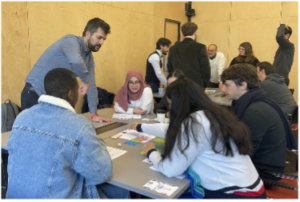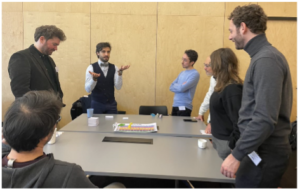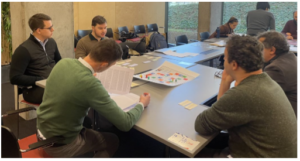Learning Through Playing: LeADS Discussion Games
2024, the final year of the LeADS project, kickstarted with an intensive three-day meeting packed with a wide variety of LeADS activities. Organized by the LeADS consortium, the activities took place in Brussels on the campus by LeADS beneficiary VUB. The first day of the LeADS meeting kicked off with a playtesting session on discussion games which the ESRs have been developing during the last quarter of 2023.

The ambition of the LeADS project has always been that the dissemination and communication of its results are not only a concern for a highly specialized audience, such as academics and practitioners. Instead, we think that our results are highly relevant and should also be communicated to the general public.
The discussion games thus constitute one of many means of the LeADS project to achieve a wider dissemination of the research of our ESRs to a wider public. Four discussion games, one per crossroad, have been developed and were play-tested for the first time with external participants (students and other researchers from VUB). All game materials for each boardgame are publicly available on Zenodo (see below)
In Crossroad 1’s boardgame ‘Know-IT-All’, players have to answer questions in six categories (Data as a Commodity, Privacy, Curiosity, Intellectual Property, AI, Big Tech) in order to progress through the game board and collect points.
In Crossroad 2’s boardgame ‘Jury Trials’, a role-playing game designed for people with a background in law and data privacy. The context of the game is around defending a company’s public image against attackers who try to destroy its reputation in a specific scenario case.
 In Crossroad 3’s boardgame, ‘SynergyLegal: Legal and Technical Challenges around Data Rights’, players have to solve challenges that are connected to the broad topic of data ownership.
In Crossroad 3’s boardgame, ‘SynergyLegal: Legal and Technical Challenges around Data Rights’, players have to solve challenges that are connected to the broad topic of data ownership.
In Crossroad 4’s boardgame, ‘Privacylandia’, players take the role of inhabitants of a fictional town. Each player needs to collaborate with at least another player and use his/her knowledge in legal and technological domains to solve challenges that data subjects may face in real life.
of a fictional town. Each player needs to collaborate with at least another player and use his/her knowledge in legal and technological domains to solve challenges that data subjects may face in real life.





